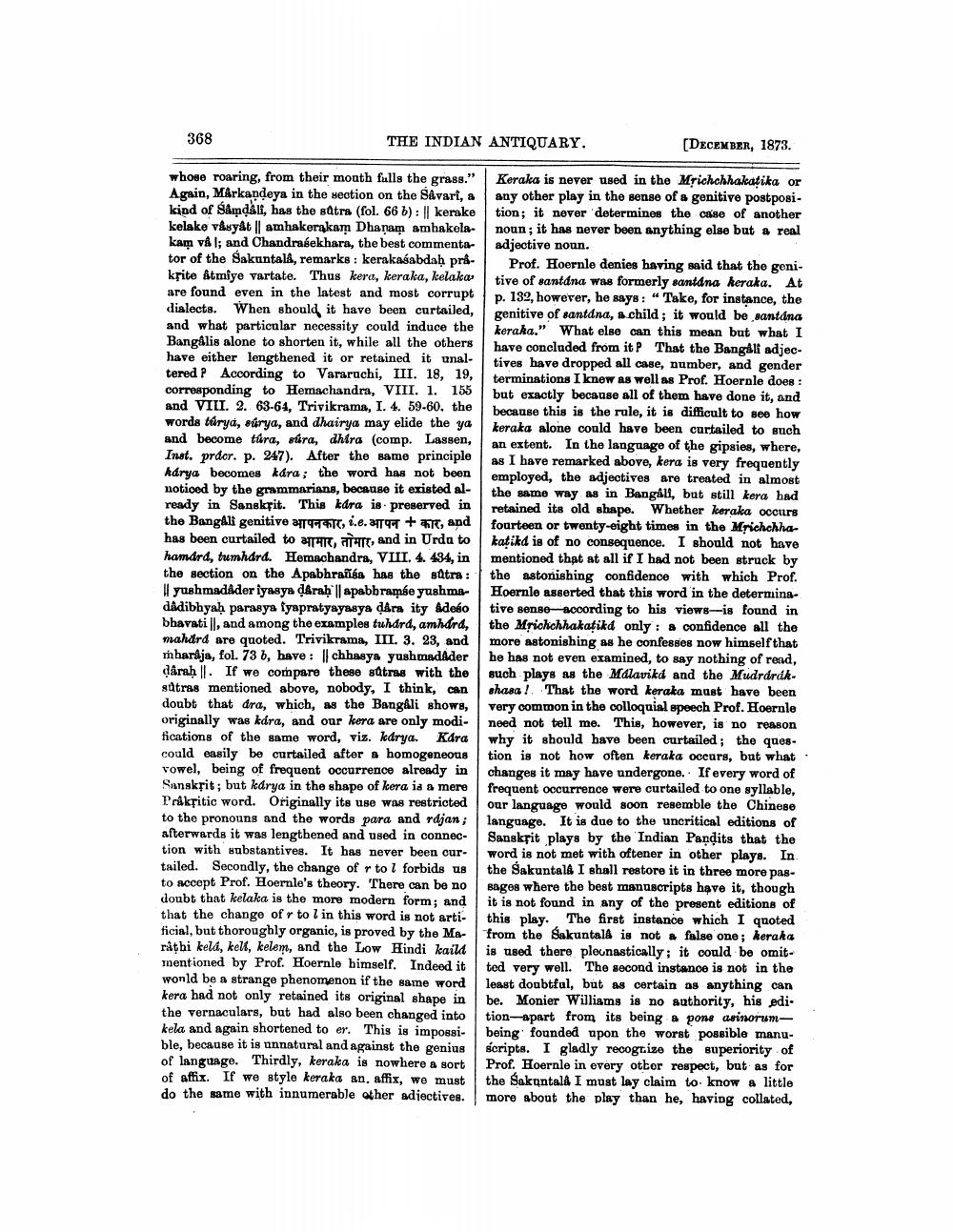________________
368
THE INDIAN ANTIQUARY.
[DECEMBER, 1873.
whose roaring, from their mouth fulls the grass." Keraka is never used in the Msichchhakatika or Again, Markandeya in the section on the Savart, a any other play in the sense of a genitive postposikind of Såmdali, has the sutra (fol. 66 b): || kerake tion; it never determines the case of another kelake v&syat || amhakerakam Dharam ambakola- noun; it has never been anything else but a real kam vål; and Chandrasekhara, the best commenta- adjective noun. tor of the Sakuntala, remarks: kerakasabdah pre- Prof. Hoernle denies having said that the geniksite åtmiye vartate. Thus kera, keraka, kelaka tive of santana was formerly santana keraka. At are found even in the latest and most corrupt
p. 132, however, he says: "Take, for instance, the dialects. When should it have been curtailed,
genitive of santdna, a child; it would be santana and what particular necessity could induce the keraka." What else can this mean but what I Bangális alone to shorten it, while all the others
have concluded from it P That the Bangéli adjechave either lengthened it or retained it unal
tives have dropped all case, number, and gender tered ? According to Vararuchi, III. 18, 19,
terminations I knew as well as Prof. Hoernle does : corresponding to Hemachandra, VIII. 1. 155
but exactly because all of them have done it, and and VIII. 2. 63-64, Trivikrama, I. 4. 59-60. the
because this is the rule, it is difficult to see how words türya, orya, and dhairya may elide the ya
keraka alone could have been curtailed to such and become túra, súra, dhira (comp. Lassen,
an extent. In the language of the gipsies, where, Inst. prder. p. 247). After the same principle as I have remarked above, kera is very frequently Adrya becomes kára; the word has not been
employed, the adjectives are treated in almost noticed by the grammarians, because it existed al
the same way as in Bangall, but still kera bad ready in Sanskrit. This kdra is preserved in
retained its old shape. Whether keraka ocours the Bangali genitive a46T, 1..19 + , and fourteen or twenty-eight times in the Michchhahas been curtailed to afHR, TATC, and in Urda to katikd is of no consequence. I should not have hamárd, tumhard. Hemachandra, VIII. 4. 434, in mentioned that at all if I had not been struck by the section on the Apabhrañía has the sutra: the astonishing confidence with which Prof. Il yushmadâderiyasya darah || apabbrambe yushma- Hoernle asserted that this word in the determinadadibhyah parasya Tyapratyayasya dara ity Adebo tive senso-according to his views--is found in bhavati), and among the examples tuhard, amhara, the Msichchhakatikd only : a confidence all the mahdrd are quoted. Trivikrama, III. 3. 23, and more astonishing as he confesses now himself that mharaja, fol. 73 b, have : | chhasya yushmadAder he has not even examined, to say nothing of rend, darah ||. If we compare these sotras with the such plays as the Malavikd and the Mudrdrdk. sätras mentioned above, nobody, I think, canshasa ! That the word keraka must have been doubt that dra, which, as the Bangkli shows, | very common in the colloquial speech Prof. Hoernle originally was kara, and our kera are only modi- need not tell me. This, however, is no reason fications of the same word, viz. kedrya. Kdra why it should have been curtailed; the ques. could easily be curtailed after a homogeneous tion is not how often keraka oocars, but what vowel, being of frequent occurrence already in changes it may have undergone. If every word of Sanskrit; but karya in the shape of kera is a mere frequent occurrence were curtailed to one syllable, Prakritic word. Originally its use was restricted our language would soon resemble the Chinese to the pronouns and the words para and rdjan; language. It is due to the uncritical editions of afterwards it was lengthened and used in connec- Sanskrit plays by the Indian Pandits that the tion with substantives. It has never been cur- word is not met with oftener in other plays. In tailed. Secondly, the change of r to i forbids us the Sakuntal I shall restore it in three more pasto accept Prof. Hoernle's theory. There can be no Bages where the best manuscripts have it, though doubt that kelaka is the more modern form; and it is not found in any of the present editions of that the change or to in this word is not arti- this play. The first instance which I quoted ficial, but thoroughly organic, is proved by the Ma- from the Sakuntala is not false one; keraka råthi keld, kel, kelem, and the Low Hindi kaild is used there pleunastically; it could be omitmentioned by Prof. Hoernle himself. Indeed it tod very well. The second instance is not in the wonld be a strange phenomenon if the same word least doubtfal, but as certain as anything can kera had not only retained its original shape in be. Monier Williams is no authority, his edi. the vernaculars, but had also been changed into tion-apart from its being a pone asinorum kela and again shortened to er. This is impossi- being founded upon the worst possible manuble, because it is unnatural and against the genius scripts. I gladly recogrize the superiority of of language. Thirdly, keraka is nowhere a sort Prof. Hoernle in every other respect, but as for of affix. If we style keraka an, affix, we must the Sakuntala I must lay claim to know a little do the same with innumerable other adjectives. more about the play than he, having collated,




